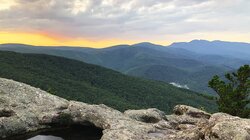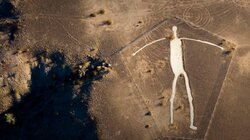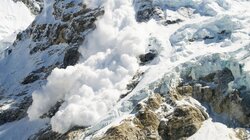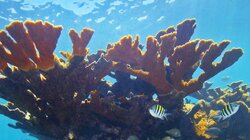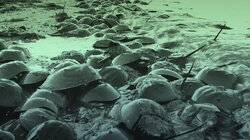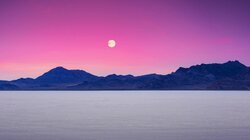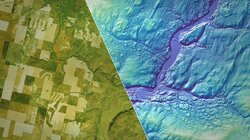Season 1
Episode: 1x01 | Airdate: Sep 24, 2020 (7 min)
The trees in the Blue Ridge Mountains are responsible for that dreamy blue haze on the horizon. Trees produce fine mists of volatile organic compounds (VOCs), which scatter blue light waves. In the mid-90s, the area had serious air quality issues. Not only was it dangerous to breathe, the hazy blue was disappearing from the horizon. But it wasn't just the trees fault. Here's what happened...
Episode: 1x02 | Airdate: Oct 8, 2020 (8 min)
Are real-life fire lookouts becoming obsolete due to modern technology? Meet Mark Hufstetler, a fire lookout at Baptiste Tower in Flathead National Forest, Montana, who believes human observation is still imperative in fire detection and management. See how people like Mark have been protecting our forests for over a century and continue to play a vital role in protecting our natural resources.
Episode: 1x03 | Airdate: Oct 22, 2020 (7 min)
Wild horses made their home on the islands of North Carolina centuries ago. Today, they are celebrities on these islands drawing thousands of people every summer to the northern beaches of North Carolina. However, the horse population needs to be managed because they can cause serious damage to the ecosystem. How can we respect these horses and keep them wild while protecting the islands?
Episode: 1x04 | Airdate: Nov 12, 2020 (7 min)
The fall colors of New England is one of the most breathtaking natural spectacles on earth. Trillions of green leaves across New England transform into the brilliant hues of fall. But the reasons why are still a bit of a mystery.
Episode: 1x05 | Airdate: Dec 4, 2020 (8 min)
It's called the Land of Arches. With more than 100 natural sandstone arches, Kentucky's Red River Gorge is a breathtaking natural spectacle. The gorge is considered one of the world's premier rock climbing destinations. It's also a haven for rare plants and animals. Why? The rugged topography that makes this place so conducive for climbing has also created a place where rare species thrive.
Episode: 1x06 | Airdate: Dec 17, 2020 (7 min)
The three human figures and two animals that make up the Blythe Geoglyphs - or Blythe Giant Intaglios - are enormous. So big in fact, that they can't be fully appreciated from the ground. But the figures were carved into the earth long before air travel was invented. So who made them...and why?
Episode: 1x07 | Airdate: Jan 14, 2021 (8 min)
The prairie landscape has come to symbolize the American heartland. But an ecosystem that once covered a vast swath of the continent has all but disappeared. Just a tiny fraction remains. But researchers and conservationists in Oklahoma may have hit upon two surprising keys to saving this lost ecosystem: bison and fire. Their efforts could help restore degraded grasslands around the world.
Episode: 1x08 | Airdate: Jan 28, 2021 (8 min)
Experience the world through two-time Drone Racing League Champion Jordan Temkin's eyes as we dive into the mechanics and the physics of FPV (First-Person View) drones.
Episode: 1x09 | Airdate: Feb 18, 2021 (8 min)
It's a mile long and 150 feet high, and covered in the most spectacular ice falls anyone has ever seen. And it's all human made. The Ouray Ice Park is the world's premiere location for ice climbing and attracts visitors from around the world. Nobody has ever attempted to create anything on this scale. How do they do it?
Episode: 1x10 | Airdate: Mar 11, 2021 (10 min)
Traffic is one of the biggest problems plaguing cities today. Idling cars cause increased emissions, more traffic means more accidents, and it is, of course, annoying. Meet traffic scientist, Dr. Alex Bayen who is working to solve traffic with automation.
Episode: 1x11 | Airdate: Apr 1, 2021 (8 min)
Avalanches are mysterious and complex and the science of these natural phenomena is incomplete. But one thing that is known is how to prevent them. To do that, you have to do something counterintuitive — you have to start them.
Episode: 1x12 | Airdate: Apr 20, 2021 (9 min)
Most the of 600 billion pounds of waste that Americans produce every year ends up in landfills. All that trash can have huge impacts on the environment. But modern landfills have found a new use for all that trash — they're turning it into energy.
Episode: 1x13 | Airdate: May 13, 2021 (9 min)
Texas is an oil state, right? Yes! But it's also a wind state. If Texas were a country it would be fifth in the world for wind energy generation. Take a trip through wind country with host Joe Hanson as he explores a wind farm in his home state of Texas.
Episode: 1x14 | Airdate: Jun 3, 2021 (7 min)
Corals all over the world are threatened by warming ocean temperatures. But 30 years of data show that reefs off the Florida Keys could protect themselves from rising temperatures if they weren't also dealing with nutrient pollution coming from land. What's weakening these corals? Sewage. And there's something we can do about it.
Episode: 1x15 | Airdate: Jul 1, 2021 (11 min)
The ancient forests of the Pacific Northwest are home to giant trees and many secrets, which science is just beginning to understand. But these forests are at risk of disappearing. In British Columbia on First Nations territory, a small band of forest defenders are risking life and liberty to protect some of the last remaining ancient forests.
Episode: 1x16 | Airdate: Jul 15, 2021 (8 min)
Cars dominate US city streets, and there's no better example than Atlanta, GA. Streets in Atlanta are designed for getting cars around as fast as possible. The result? Pedestrian deaths in ATL are twice the national average. But the city is trying to change that, starting with Peachtree Street.
Episode: 1x17 | Airdate: Aug 5, 2021 (9 min)
Roller coasters have the power to heal. Host Joe Hanson explores the world of coasters, exploring the safety protocols ride engineers consider in designing them and the impact they have on the human body. We learn about how the experience of riding coasters can have positive impacts in our lives.
Episode: 1x18 | Airdate: Aug 31, 2021 (8 min)
Every spring, the beaches of Delaware Bay play host to one of the world's wildest parties. Millions of prehistoric crabs (and hundreds of thousands of birds) converge here. These horseshoe crabs spend most of their lives in the ocean depths. But every May and June, their spindly little legs will carry them 60 miles or more to congregate on sandy beaches up and down the Atlantic coast.
Episode: 1x19 | Airdate: Oct 7, 2021 (9 min)
It was the scene of the most cataclysmic natural disaster in American history, a place of unimaginable devastation. Today, the crater of Mt. St. Helens Volcano is experiencing a rebirth — it's the site of the world's newest glacier. Not only is it the newest, it's also one of the few that's growing. What's behind its growth and how might it one day help scientists discover life on other planets?
Episode: 1x20 | Airdate: Oct 20, 2021 (11 min)
Why do dunes sing? Head into the mysterious world of sand with host Joe Hanson! Along the way we meet Dr. Melany Hunt and Dr. Nathalie Vriend who solved the longstanding mystery of why dunes sing.
Episode: 1x21 | Airdate: Nov 5, 2021 (9 min)
Chicago is the third-largest city in the U.S., and one of the country's most diverse. There's a secret subculture here that's growing larger by the year but lurks out of sight in shadow — coyotes! More than 4,000 of these canines prowl the streets of Chicago; you'll even find them stalking amongst the skyscrapers of Michigan Avenue and busy Lake Shore Drive.
Episode: 1x22 | Airdate: Nov 11, 2021 (7 min)
The Bonneville Salt Flats are perfect for speed. Every year, cars and motorcycles break land speed records on the flat expanse of the Bonneville Salt Flats. It's been a tradition for more than a century, and racers have built a thriving community around the salt races. But how did these salt flats form, and why are they disappearing now?
Episode: 1x23 | Airdate: Nov 18, 2021 (10 min)
The charismatic beaver is more than a charming, vegetarian stream-dweller. it's actually a master architect, capable of restoring rivers, bringing back dwindling fish populations and even preventing wildfire. Travel with host Joe Hanson to Central Oregon where a group of scientists set up a kind of beaver laboratory to learn more about the crepuscular creatures.
Episode: 1x24 | Airdate: Dec 23, 2021 (10 min)
The Everglades is a water world — It's the widest and slowest river in the United States. But in the heart of this great water body exist secret islands that have outsize importance for the cultural heritage of a people and for the biodiversity of this important wetland.
Season 2
Episode: 2x01 | Airdate: Jun 20, 2024 (13 min)
Join Joe in this exploration of a true titan of modern engineering: the world's largest crane. With a lifting capacity of 5,000 tons, this giant ring crane at Rotterdam's Mammoet headquarters is a true powerhouse that plays a crucial role in the renewable energy revolution, building massive offshore wind turbines that help combat climate change. And yes, they may let Joe drive it.
Episode: 2x02 | Airdate: Jul 18, 2024 (10 min)
The Channeled Scablands of the Pacific Northwest hide an astonishing secret. Evidence of a massive flood that shaped the entire region lies just beneath its landscape. But it can only be seen with cutting edge LIDAR technology. Join Joe as he learns how scientists are using lasers to reveal details that may help us predict the paths of potential megafloods of the future.
Episode: 2x03 | Airdate: Aug 15, 2024 (10 min)
Hidden beneath the surface of our coastal seas are towering forests - of kelp. These underwater ecosystems are as crucial to our environment as their land-based counterparts. We'll explore them alongside conservationists who are working to restore these threatened habitats. We'll also meet some adorable sea otters and learn about their role in maintaining the balance in this sensitive environment.
Episode: 2x04 | Airdate: Sep 14, 2024 (10 min)
The Choco region in northwest Ecuador is hosting a groundbreaking experiment to try and help its rainforests recover from rampant deforestation. A multinational team is planting small "tree islands" to attract natural seed dispersers. It's an innovative approach that we'll take a close look at, from above and within.
Episode: 2x05 | Airdate: Oct 18, 2024 (17 min)
This episode explores the mystery of the vanishing Colorado River Delta. Once a lifeline for the American Southwest, it's now a shadow of its former self. What happened? Outdated water laws? Excessive urban development and agriculture? Is there a possibility for restoration? Let's investigate.
Episode: 2x06 | Airdate: Nov 22, 2024 (12 min)
In its prime, Cahokia was a prosperous city with a population similar to London's. But this sprawling Native American metropolis from the Mississippian culture vanished long before Europeans arrived in North America. What happened? Now, cutting-edge scientific research offers a glimmer of hope in unraveling the mystery of Cahokia's disappearance.
Episode: 2x07 | Airdate: Dec 13, 2024 (14 min)
The 1700 Cascadia earthquake and tsunami was a natural disaster that reshaped the Pacific Northwest. Through tree rings, soil layers and international collaboration, scientists have pieced together the exact timing of the event. As the region braces for another quake, can we prepare in time? Find out how new models and tsunami evacuation towers are helping coastal communities face the threat.
Episode: 2x08 | Airdate: Jan 24, 2025 (12 min)
Florida's native crocodiles have found an unexpected sanctuary in the cooling canals at Turkey Point Nuclear Power Plant. This fortunate happenstance, along with tireless conservation efforts, are helping these once endangered predators make a remarkable comeback.
Episode: 2x09 | Airdate: Feb 22, 2025 (11 min)
The Outer Banks, known as the "Graveyard of the Atlantic," is home to thousands of shipwrecks, including Blackbeard's infamous Queen Anne's Revenge. But beyond the maritime history, this fragile coastline is rapidly changing—threatened by shifting sands, rising seas, and intensifying storms that could reshape it forever.



